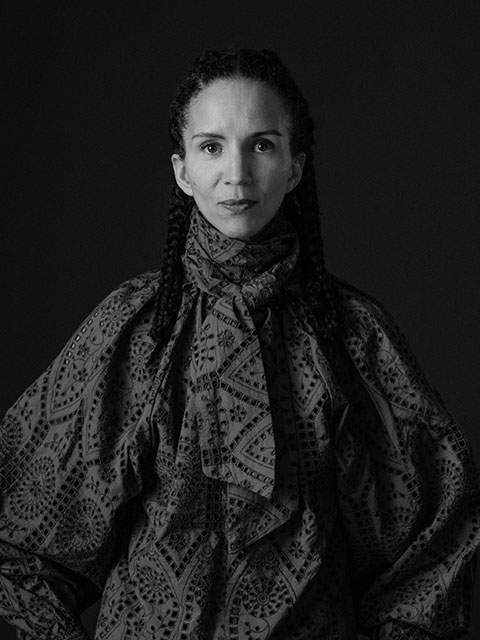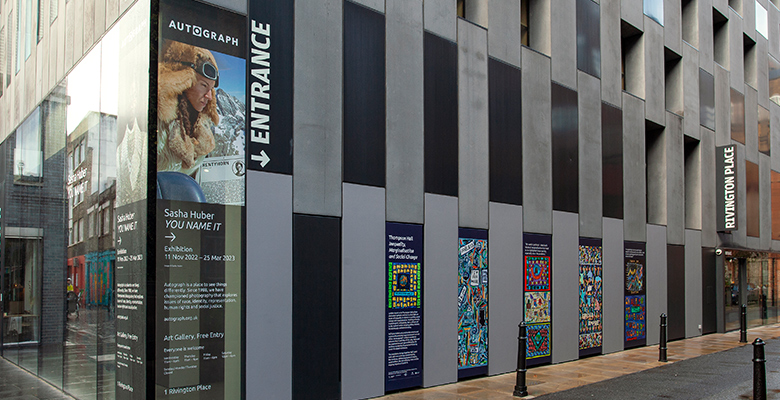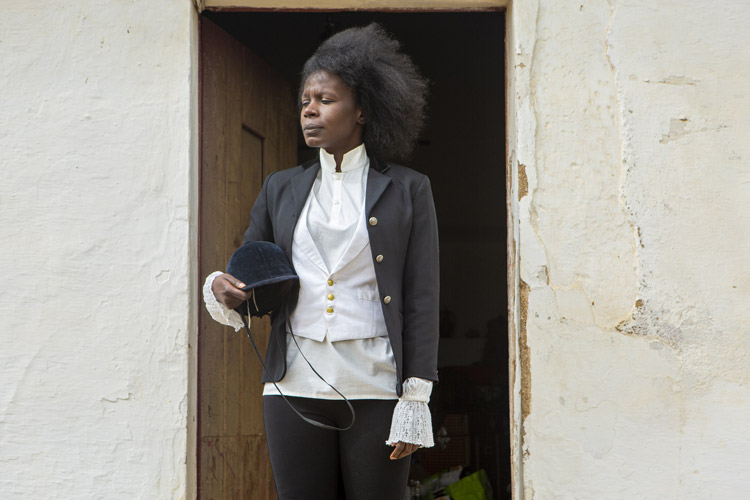Sasha Huber explores how colonial histories are imprinted into the landscape through naming and acts of remembrance - asking what actions it might take to repair the inherited traumas of history.
YOU NAME IT brings together over a decade of Huber’s work, prompted by the campaign Demounting Louis Agassiz. Initiated in 2007 by Swiss historian and activist Hans Fässler, the campaign seeks to redress the legacy of the Swiss-born glaciologist and racist Louis Agassiz (1807–1873). His scientific contributions to the fields of glaciology, palaeontology and geology resulted in over 80 landmarks bearing his name on Earth, the Moon, and Mars. Less well known, however, was Agassiz’s legacy of ‘scientific’ racism, and how he used his position to actively promote the subjugation, exploitation, and segregation of Black people and other people of colour. He commissioned J.T. Zealy (1812-1893) to photograph enslaved people on the Edgehill plantation in South Carolina in March of 1850, using the technology of photography to further his eugenics campaign.
At the heart of this exhibition is Tailoring Freedom, including portraits of Renty and Delia Taylor, an enslaved Congolese father and daughter whose portraits were forcibly taken by Zealy and used by Agassiz. Huber reproduced Zealy’s daguerreotypes onto wood and used her signature staple gun method to ‘dress’ Renty in a suit inspired by Frederick Douglass (1818–1895), and Delia in a clothing inspired by Harriet Tubman (1849–1913), honouring the contributions of both abolitionists. These works are shown alongside Huber’s video, photography, performance and research unearthing Agissiz’s racist legacy, and efforts to remove his name from a mountain in the Swiss Alps and replace it with Renty’s – one of the goals of the Demounting Louis Agassiz campaign.
Huber’s desire to use art to heal colonial and historic traumas can be seen throughout the exhibition. The artist uses a staple gun to “symbolically stitch wounds together”, creating visually arresting portraits. This technique can be seen in The Firsts – Tilo Frey, commemorating the Swiss-Cameroonian politician who campaigned for women’s rights and suffrage in Switzerland; and in Khadija Saye: You Are Missed, honouring the late artist, activist and carer who died alongside her mother in the Grenfell Tower fire in 2017.
Presented in the gallery window is Space Race, Huber’s 3d animation reflecting how racist histories have influenced cosmic colonisation. She asks us to consider “what’s in a name” and what do we evoke on earth – and beyond – with these names?
Huber’s artworks present a vision for the ways we can tenderly, and with care, refute the damage already inflicted by history. In challenging the terms by which we remember, the artist asks who and what we memorialise, and more importantly, how we do so.

is a Helsinki-based, multidisciplinary visual artist-researcher of Swiss-Haitian heritage. Sensitive to the subtle threads connecting history and the present, she uses and responds to archival material within a layered creative practice that encompasses performance-based interventions, video, photography, and collaborations.
Huber frequently reclaims – aware of its symbolic significance – the compressed-air staple gun as an artistic ‘weapon’, tapping into its potential to renegotiate unequal power dynamics. She is known for her artistic research contribution to the Demounting Louis Agassiz campaign which aims to dismantle the glaciologist’s lesser-known but contentious racist heritage. Huber also often works in a creative partnership with artist Petri Saarikko with whom she initiated the long-term project Remedies Universe.
Huber holds an MA in visual culture from the Aalto University and is presently undertaking a practice-based PhD at Zurich University of the Arts. Huber has had numerous solo presentations, artist residencies and participated in international exhibitions and festivals, including the 56th Venice Biennial in 2015. In 2021 Huber’s solo exhibition tour YOU NAME IT began at Kunstinstituut Melly in Rotterdam and continues to The Power Plant Contemporary Art Gallery in Toronto; Autograph in London in 2022/23; and Turku Art Museum in Finland in 2023. In 2018 the Arts Promotion Centre Finland awarded Huber the State Art Award in the category visual arts and in 2022 she received a multi-year artist grant.
£40, available now at Autograph's gallery and online shop. A new, comprehensive publication focusing on the artwork and activism of Sasha Huber
Honouring the Cameroonian-Swiss politician who campaigned for women’s suffrage in Switzerland
Commemorating seven enslaved individuals, adopting art as a means to heal colonial traumas
Commemorating the artist, activist and carer who tragically died in the 2017 Grenfell Tower fire

Everyone is welcome at Autograph. We care about our visitors, staff, artists and community, and have measures in place to help ensure a safe visit for everyone. Have a look at our Visit Us page, it has full information about Covid-19 safety and accessibility at Autograph.
Please note: this exhibition addresses sensitive topics around colonialism

Autograph's new commissioning project considering contemporary Afrodiasporic experiences in Europe
Find out moreYOU NAME IT was initiated, organised, and circulated by The Power Plant Contemporary Art Gallery, Toronto, in collaboration with Kunstinstituut Melly, Rotterdam; Autograph, London, United Kingdom; and Turku Art Museum, Finland.
Autograph has supported the creation of several works in YOU NAME IT. The Firsts – Tilo Frey (2021) and Khadija Saye: You Are Missed (2021) were commissioned by Autograph as part of our project Amplify – Stranger in the Village: Afro European Matters, supported by the Art Fund. Additionally, five new portraits on display from the series Tailoring Freedom (2021 – ongoing) have been commissioned by The Power Plant Contemporary Art Gallery, Toronto; Autograph, London; Turku Art Museum, Finland; and Kunstinstituut Melly, Rotterdam.
The fur used in Sasha Huber's work is artificial
Banner image: Sasha Huber, Agassiz Down Under [detail], 2015. Courtesy the artist.
Exhibition preview: 1 and 5) Sasha Huber: YOU NAME IT exhibition at Autograph. 11 November 2022 - 25 March 2023. Curated by Renée Mussai, Mark Sealy and Bindi Vora. Photograph by Kate Elliot. 2) Sasha Huber, Tilo Frey from the series The Firsts, 2021. Courtesy of Autograph, London. 3) Sasha Huber, Agassiz Down Under, 2015. Courtesy the artist. 4) Sasha Huber, Tailoring Freedom – Renty and Delia, 2021. Courtesy Tamara Lanier and the artist. Commissioned by The Power Plant Contemporary Art Gallery, Toronto; Autograph, London; Turku Art Museum, Finland; and Kunstinstituut Melly, Rotterdam. Original photographs: Renty 35-5-10/53037; Delia 35-5-10/53040, courtesy of the Peabody Museum of Archaeology and Ethnology, Harvard University. 6) Sasha Huber, film still from Space Race, 2018. Animation, 4' min. Courtesy the artist. 7) Sasha Huber, film still from Karakia - The Resetting Ceremony, 2015. 5'20" min. Courtesy the artist.
New commissions: 1) Sasha Huber, film still from The Firsts - Tilo Frey, 2021. Video, 4"45'. Music by Brandy Butler, ‘Before The Tide’. © the artist. Courtesy of / commissioned by Autograph, 2021. Supported by Art Fund. 2) Sasha Huber, Tailoring Freedom – Jem [detail], 2022. Metal staples on photograph on wood, 49 x 69 cm. Courtesy the artist. Commissioned by The Power Plant, Toronto; Autograph, London; Turku Art Museum, Finland; and Kunstinstituut Melly, Rotterdam, 2022. Original image courtesy the Peabody Museum of Archaeology and Ethnology, Harvard University, 5- 10/53046. 3) Sasha Huber, Khadija Saye - You Are Missed [detail], 2021-22. Metal staples on fire burned wood; 104.5 x 73.5 cm © the artist. Courtesy of / commissioned by Autograph, 2021. Supported by Art Fund.
Call for photographs: Sasha Huber, Agassiz Down Under [detail], 2015. Courtesy the artist.
About the artist: Courtesy Sasha Huber. Visit us: Autograph, photograph by Zoë Maxwell.
Autograph is a space to see things differently. Since 1988, we have championed photography that explores issues of race, identity, representation, human rights and social justice, sharing how photographs reflect lived experiences and shape our understanding of ourselves and others.